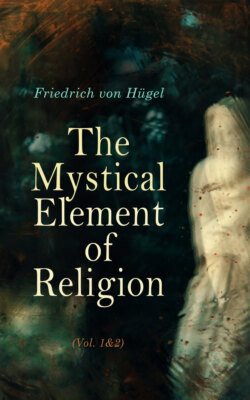Читать книгу The Mystical Element of Religion (Vol. 1&2) - Friedrich von Hügel - Страница 57
На сайте Литреса книга снята с продажи.
2. In the Emotional and Volitional Element, as against the Historical and Institutional Element.
ОглавлениеNow the tendency of a soul, when once awake to this necessary freshness and interiority of feeling with regard to God’s and her own action, will again be towards an impoverishing oneness. It will now tend to shrink away from the External, Institutional altogether. For though it cannot but have experienced the fact that it was by contact with this External that, like unto Antaeus at his contact with Mother Earth, it gained its experience of the Internal, yet each such experience tends to obliterate the traces of its own occasion. Indeed the interior feeling thus achieved tends, in the long run, to make the return to the contact with the fact that occasioned, and to the act that produced it, a matter of effort and repugnance. It seems a case of “a man’s returning to his mother’s womb”; and is indeed a new birth to a fuller life, and hence humiliating, obscure, concentrated, effortful, a matter of trust and labour and pain and faith and love,—a true death of and adieu to the self of this moment, however advanced this self may seem,—a fully willed purifying pang. Only through such dark and narrow Thermopylae passes can we issue on to the wide, sunlit plains. And both plain and sunshine can never last long at a time; and they will cease altogether, if they are not interrupted by this apparent shadow of the valley of death, this concrete action, which invariably modifies not only the soul’s environment, but above all the soul itself.
Thus does a simply mental prayer readily feel, to the soul that possesses the habit of it, a complete substitute for all vocal prayer; and a generally prayerful habit of mind readily appears an improvement upon all conscious acts of prayer. Thus does a general, indeterminate consciousness of Christ’s spirit and presence, easily feel larger and wider, to him who has it, than the apparent contraction of mind and heart involved in devotion to Him pictured in the definite Gospel scenes or localized in His Eucharistic presence. Thus again does a general disposition of regret for sin and of determination to do better readily feel nobler, to him who has it, than the apparent materiality and peddling casuistry, the attempting the impossible, of fixing for oneself the kind and degree of one’s actual sins, and of determining upon definite, detailed reforms.
Yet, in all these cases, this feeling will rapidly lead the soul on to become unconsciously weak or feverish, unless the latter manfully escapes from this feeling’s tyranny, and nobly bends under the yoke and cramps itself within the narrow limits of the life-giving concrete act. The Church’s insistence upon some vocal prayer, upon some definite, differentiated, specific acts of the various moral and theological virtues, upon Sacramental practice throughout all the states and stages of the Christian life, is but a living commentary upon the difficulty and importance of the point under discussion. And History, as we have seen, confirms all this.
